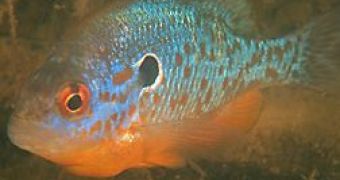Sexual behavior of many animal species can be highly promiscuous, and individuals of the same brood can find it difficult to recognize their real relatives. For example, in bluegill sunfish (Lepomis macrochirus), living in fresh waters in North American, males build and guard a nest, protecting and caring for the young. Females lay their eggs in an already-built nest before swimming and the hard work ensures a male will pass along his genes. But some males do not build and guard a nest.
Around two years old, males develop either in a nesting male or a promiscuous mate labeled a cuckolder. A cuckolder can fertilize eggs, but without accomplishing its father duties.
They spy the moment when a female releases its eggs into a nest and will swoop by and swiftly fertilize them. "If they decide to go down the cuckolder life history, that is the parasitic one that doesn't provide parental care, they become fixed in that for life, they'll spend life being be a cuckolder," said Bryan Neff.
In nests visited by several cuckolders and often containing eggs from several females, many offspring are not related.
This lifestyle makes it difficult for nest-mates to identify their real siblings.
Tim Hain and Bryan Neff of the University of Western Ontariohave discovered how the baby bluegill recognizes genuine siblings. Offspring compare the odor of nest-mates to their own genetically determined odor, and prefer to associate only with individuals that smell like themselves.
This finding may explain how social behavior operates in promiscuous animal species. Most animals - including humans - are able to recognize their relatives by remembering the individuals associated with early development.
Many animals are also highly promiscuous and thus nest-mates are not always kin (full siblings).
Individuals use aspects of their own appearance, odor, or other traits to recognize kin, but previous studies had not eliminated the possibility that early development learning might be involved. In the new study, the researchers created mixed broods, using "in vitro" fertilizations, in which some nest-mates were full siblings and others were unrelated.
Behavioral experiments and DNA analysis showed that offspring of "cuckolder" males actively sought and associated with the odor of kin siblings that they had never encountered previously. This offspring recognized unfamiliar relatives matching its own physical characteristics to those of others, and it confirms the importance of kinship in social behavior.
The team first let a fish in a tank of water for a time, "urinating and excreting various molecules from their body that provide an odor". The team repeated this with unrelated bluegill, gathering the scented water separately. After that they placed different kin-scents in various parts of the tank. Bluegill born from cuckolder nests swam over to the tank section holding kin-scent, spending most of their time in that area.
The active recognition of the true siblings could be involved in foraging and defending against predators.

 14 DAY TRIAL //
14 DAY TRIAL //